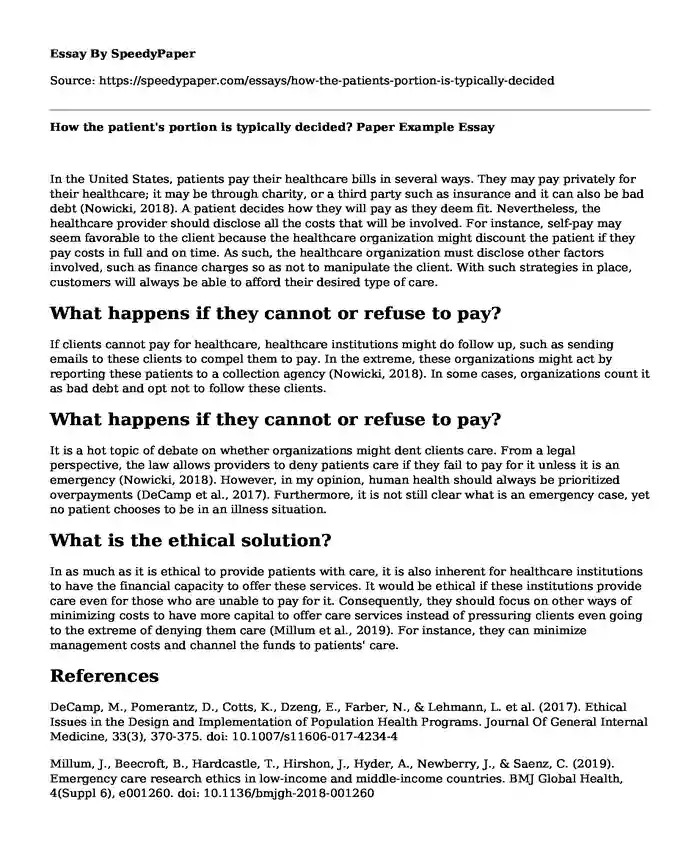
| Type of paper: | Course work |
| Categories: | Money Healthcare policy Customer service |
| Pages: | 2 |
| Wordcount: | 474 words |
In the United States, patients pay their healthcare bills in several ways. They may pay privately for their healthcare; it may be through charity, or a third party such as insurance and it can also be bad debt (Nowicki, 2018). A patient decides how they will pay as they deem fit. Nevertheless, the healthcare provider should disclose all the costs that will be involved. For instance, self-pay may seem favorable to the client because the healthcare organization might discount the patient if they pay costs in full and on time. As such, the healthcare organization must disclose other factors involved, such as finance charges so as not to manipulate the client. With such strategies in place, customers will always be able to afford their desired type of care.
What happens if they cannot or refuse to pay?
If clients cannot pay for healthcare, healthcare institutions might do follow up, such as sending emails to these clients to compel them to pay. In the extreme, these organizations might act by reporting these patients to a collection agency (Nowicki, 2018). In some cases, organizations count it as bad debt and opt not to follow these clients.
What happens if they cannot or refuse to pay?
It is a hot topic of debate on whether organizations might dent clients care. From a legal perspective, the law allows providers to deny patients care if they fail to pay for it unless it is an emergency (Nowicki, 2018). However, in my opinion, human health should always be prioritized overpayments (DeCamp et al., 2017). Furthermore, it is not still clear what is an emergency case, yet no patient chooses to be in an illness situation.
What is the ethical solution?
In as much as it is ethical to provide patients with care, it is also inherent for healthcare institutions to have the financial capacity to offer these services. It would be ethical if these institutions provide care even for those who are unable to pay for it. Consequently, they should focus on other ways of minimizing costs to have more capital to offer care services instead of pressuring clients even going to the extreme of denying them care (Millum et al., 2019). For instance, they can minimize management costs and channel the funds to patients' care.
References
DeCamp, M., Pomerantz, D., Cotts, K., Dzeng, E., Farber, N., & Lehmann, L. et al. (2017). Ethical Issues in the Design and Implementation of Population Health Programs. Journal Of General Internal Medicine, 33(3), 370-375. doi: 10.1007/s11606-017-4234-4
Millum, J., Beecroft, B., Hardcastle, T., Hirshon, J., Hyder, A., Newberry, J., & Saenz, C. (2019). Emergency care research ethics in low-income and middle-income countries. BMJ Global Health, 4(Suppl 6), e001260. doi: 10.1136/bmjgh-2018-001260
Kolakowski, D. (2016). Constructing a nursing budget using a patient classification system. Nursing Management, 47(2), 14-16. Retrieved https://journals.lww.com/nursingmanagement/Citation/2016/02000/Constructing_a_nursing _budget_using_a_patient.5.aspx
Cite this page
How the patient's portion is typically decided? Paper Example. (2023, Feb 15). Retrieved from https://speedypaper.net/essays/how-the-patients-portion-is-typically-decided
Request Removal
If you are the original author of this essay and no longer wish to have it published on the SpeedyPaper website, please click below to request its removal:
- Free Essay Example about Gladiators in Ancient Rome
- Free Paper on the Importance of a Primary School Website
- Free Essay Justifying Activities for Language and Cognitive Skills
- Vogue Fashion-Shows
- Free Essay Analyzing Columbus's "Letter to the New World"
- Essay Sample on Comparative Statistics on The Health Systems
- Transportation Study - Paper Sample
Popular categories




